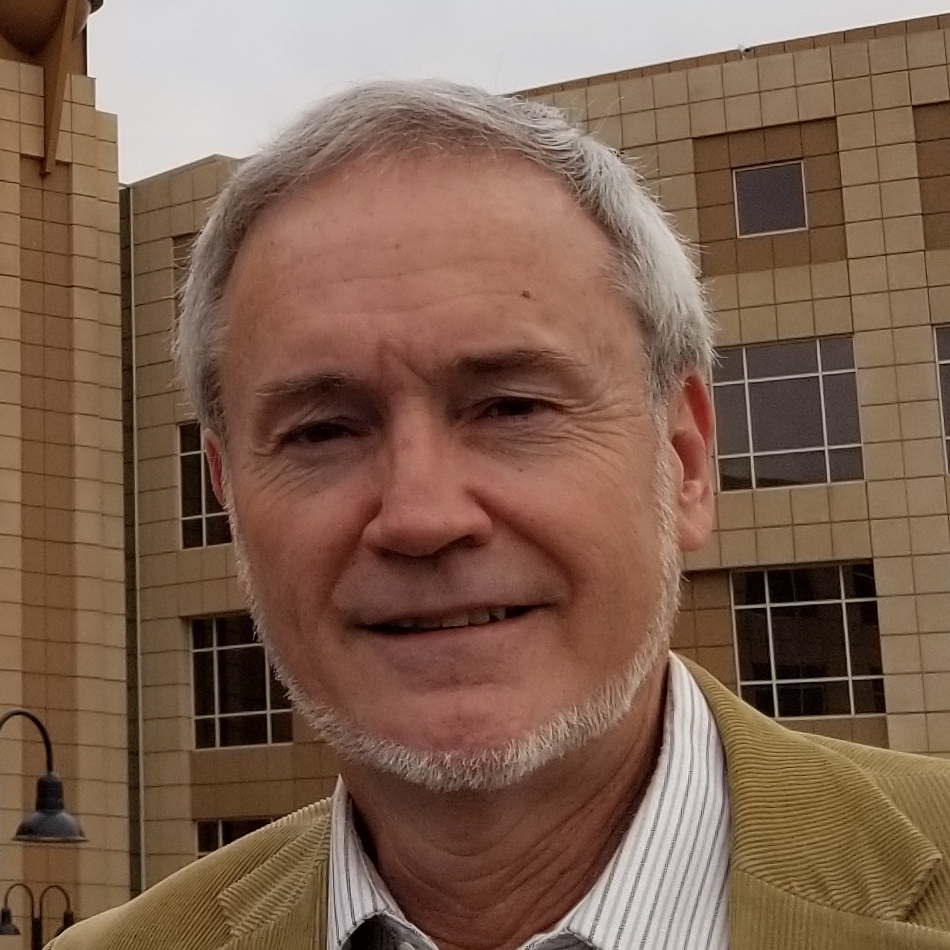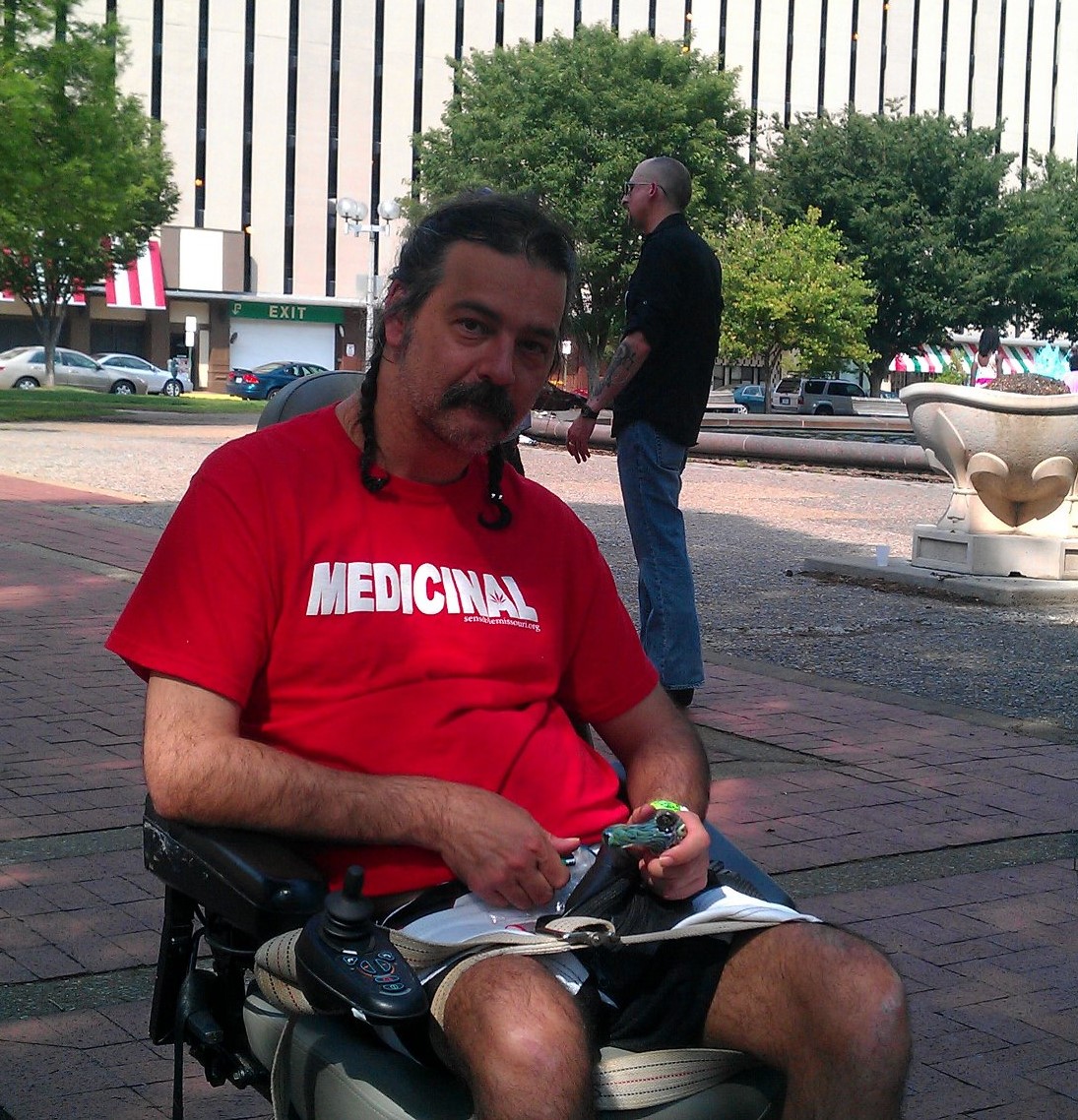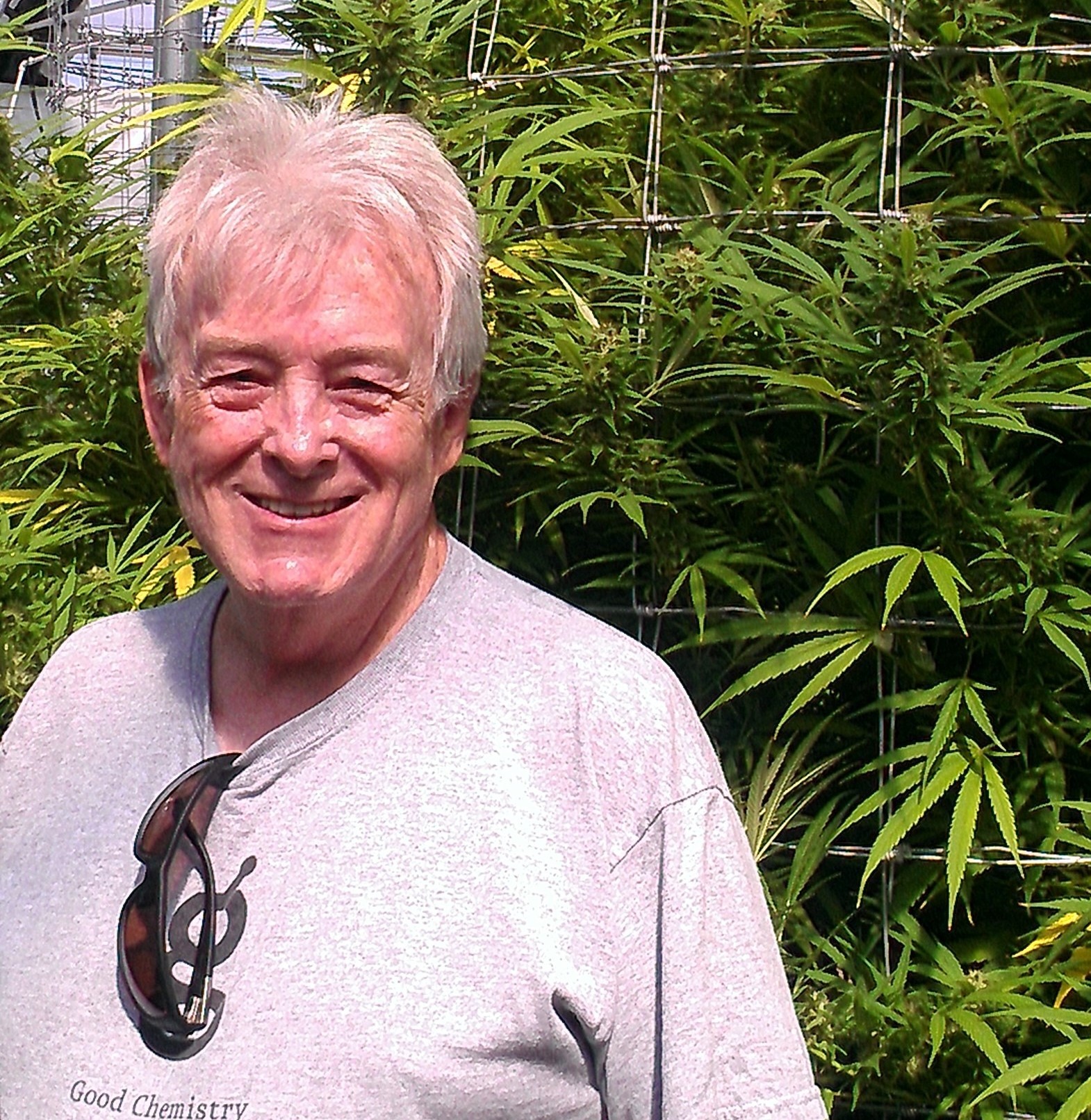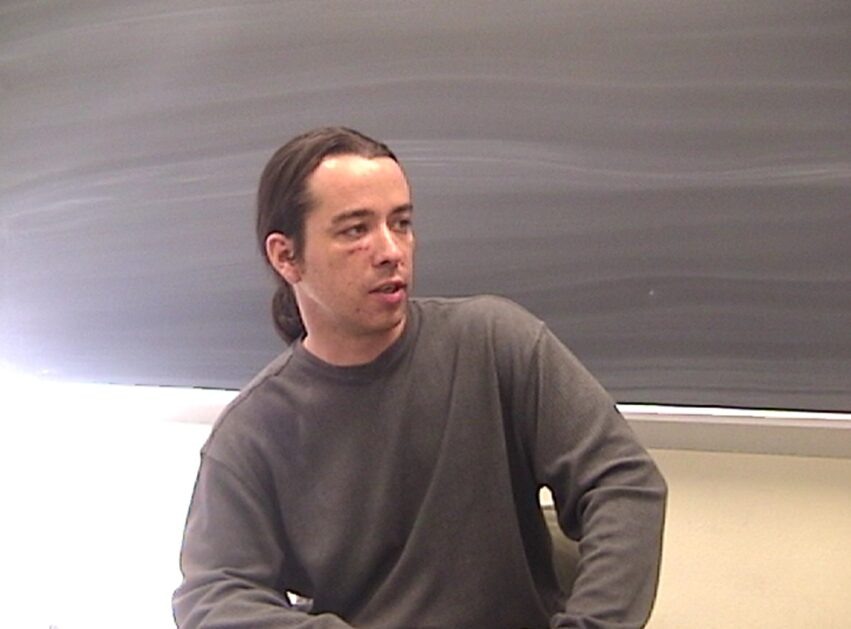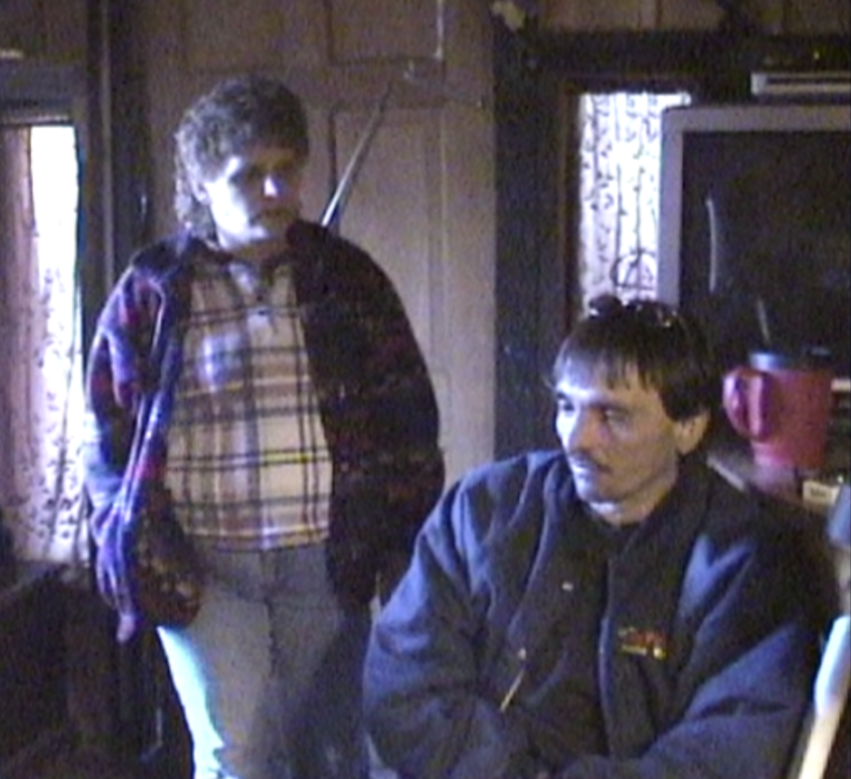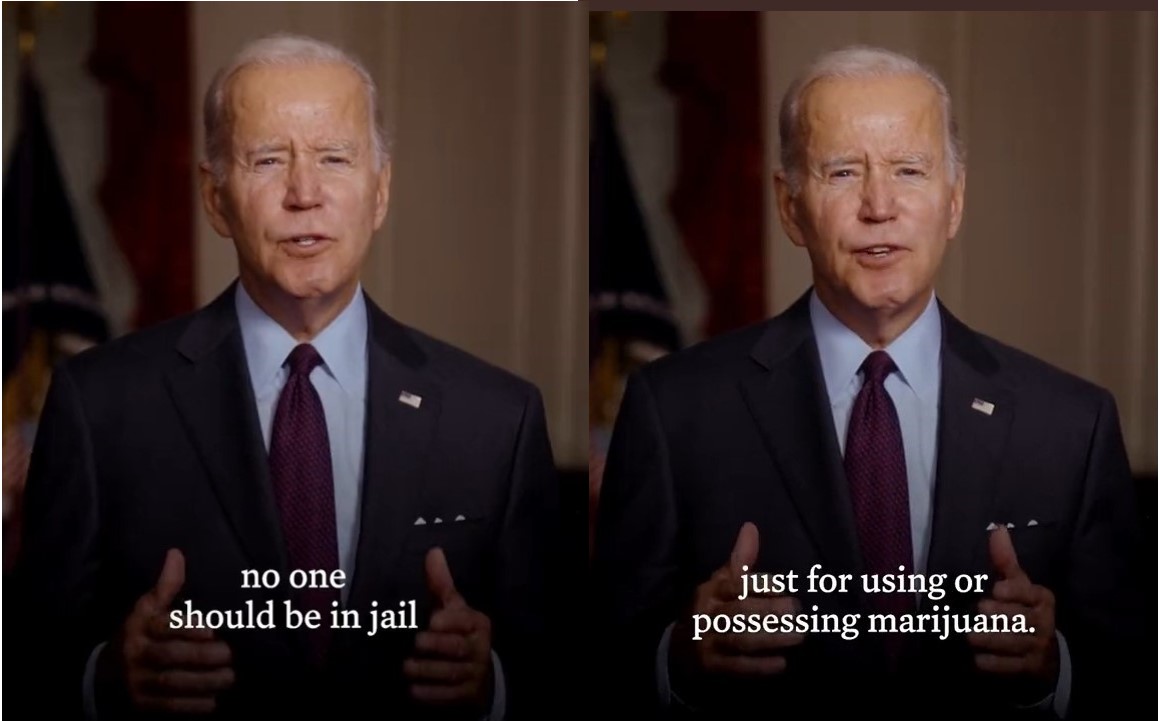I first met Jim in 2007 following a meeting of Greater St. Louis Norml. He would faithfully attend the monthly meetings whenever he could catch a ride.
Jim had a fold-able wheelchair for trips like this where there would be someone to help him or when he was taking a bus. A battered power wheelchair adorned with “marijuana” stickers carried him just about everywhere else, from his tiny sparsely decorated apartment to the streets surrounding his building. Jim lived in University City, near the “Loop” – known for its night life. Jim was a fixture there, often seen traversing the streets, all hours of the day and night. He was well-known, by the club owners and the bands, as well as many who lived in his neighborhood.
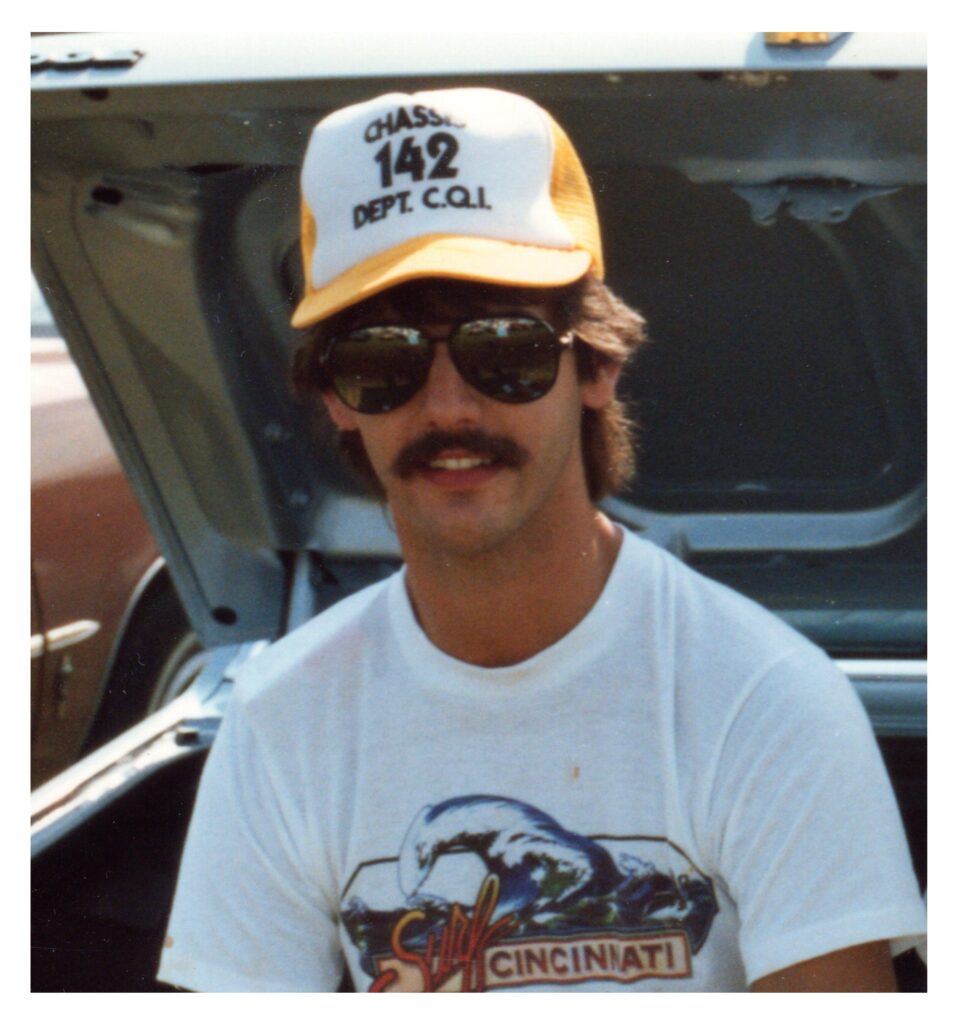
Jim usually wore a hat, though he made no effort to hide his long straight black hair that reached all the way down his back. For him to sit for this interview was a big deal for Jim. It was more than evident that he had experienced hardship far beyond anything I could have imagined. His battered wheelchair testified to his desperate cling to freedom. When he was having a good day, he was on the move. His tenacity was inspiring.
I was still quite new to doing these interviews, operating very much on a shoestring. I was still using the Hi-8 digital that I used on the Journey. There in that small, shabby apartment, we located a good wall for a backdrop and I setup the camera and tri-pod. I sat down on a kitchen chair behind the camera and we got started. I began the way I would for hundreds of times thereafter:
Mark: “Please tell us your name and where you’re from.”
Jim: “I’m Jim Hammond. I’m from St. Louis, Missouri.”
Mark: “Jim, can you tell us about your life. What was it like before MS?”
Jim: “Life before MS… I was a pretty athletic person. I did sports and whatnot.”
In fact, there was a time when life was relatively good for Jim. He was in good physical condition. He even married and fathered a child. Unfortunately, Multiple Sclerosis affects even the young and the seemingly healthy. Like many beset with MS, the symptoms came upon Jim gradually, stealthily. No doubt, his strong physical condition helped to delay the inevitable.
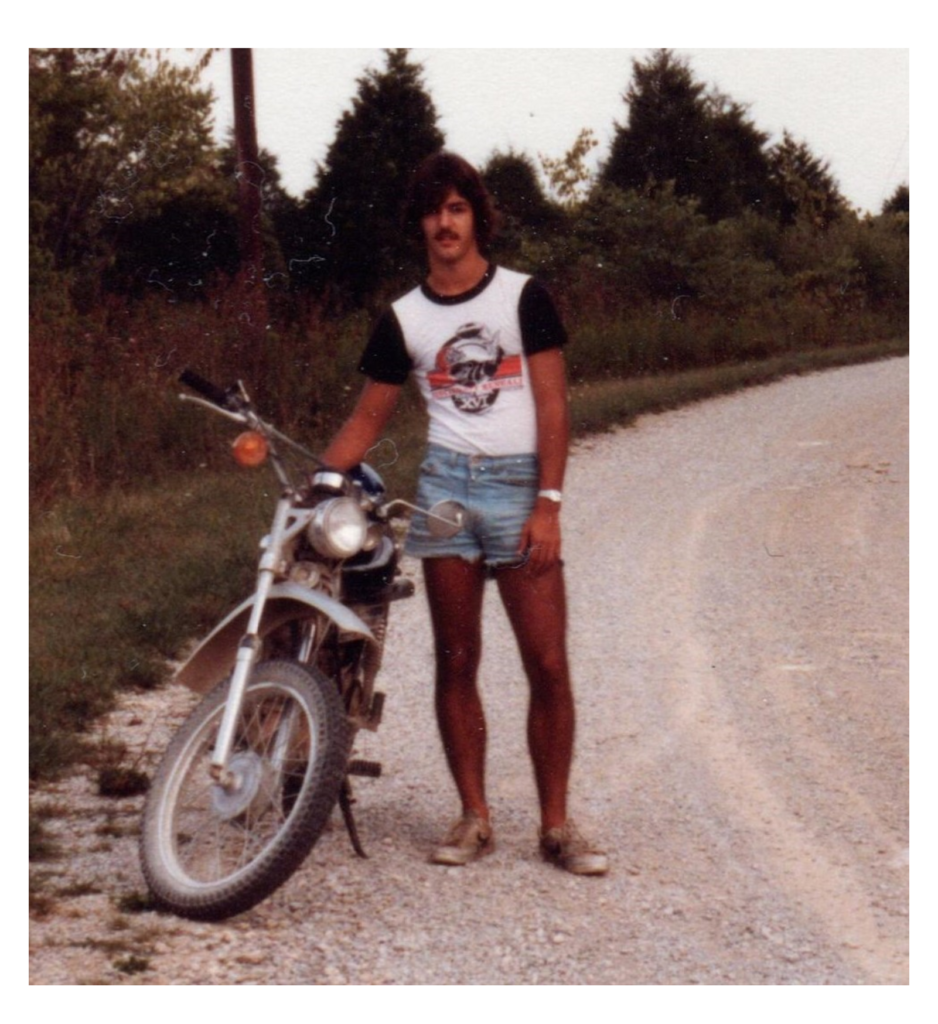
Jim: “In 1996, I had to go on disability. I was unable to work.
Jim had noticed weakness in his legs. He was experiencing fatigue as well as numbness and tingling; and, of course, pain. And it was continuing to get worse. Jim was actually a bit relieved when he heard a diagnosis of Multiple Sclerosis. “ I thought I might have a spinal tumor or something.”
But, Jim was having increasingly more difficulty walking. His balance was off. Double vision made it impossible for him to drive. And of course, all this, along with the obvious isolation that it would bring, led to depression.
And then there was the meds. Baclofen, a muscle relaxer. Something to help manage the leg spasms, but it didn’t work that well for Jim. When he would get really sick, he was put on Prednisone. Though it helped with the inflammation, he couldn’t stay on it long-term. It could thin the bones and destroy the stomach.
Jim: “I was living in Michigan at the time. I was talking to people – other people with MS.”
Cannabis had been a hot topic among MS circles.
Jim: “They asked me, ‘Have you ever tried Cannabis?’ ”
Jim had smoked recreationally for some time before his diagnosis. He recalled once in Michigan, “The wife and me wanted to go to the store.”
The store was only 200 yards away. Not far for healthy legs.
Jim: “I was having some trouble walking there normally.”
So Jim and his wife paused to smoke a joint. Shortly thereafter, they returned to walking.
Suddenly, Jim realized, “Wow! I can do this again!“
Mark: “You could walk better…”
Jim: “A lot better! It had freed me up or something. I thought, it must be medicinal, also.”
At the time of our interview, Jim had been using Cannabis (as best he could) medicinally for over twelve years.
Mark: “Now that you have been taking it for a period of time, what has been your experience with Cannabis?”
Jim: “I find it doesn’t have the bad side effects like pharmaceuticals. It actually works. I know it may not cure it, but it helps the symptoms. Seems like when I smoke it, I’m able to stand for a little bit. My legs feel stronger. The symptoms seem to go away. The numbness in my hands…the tingling – it seems to subside.”
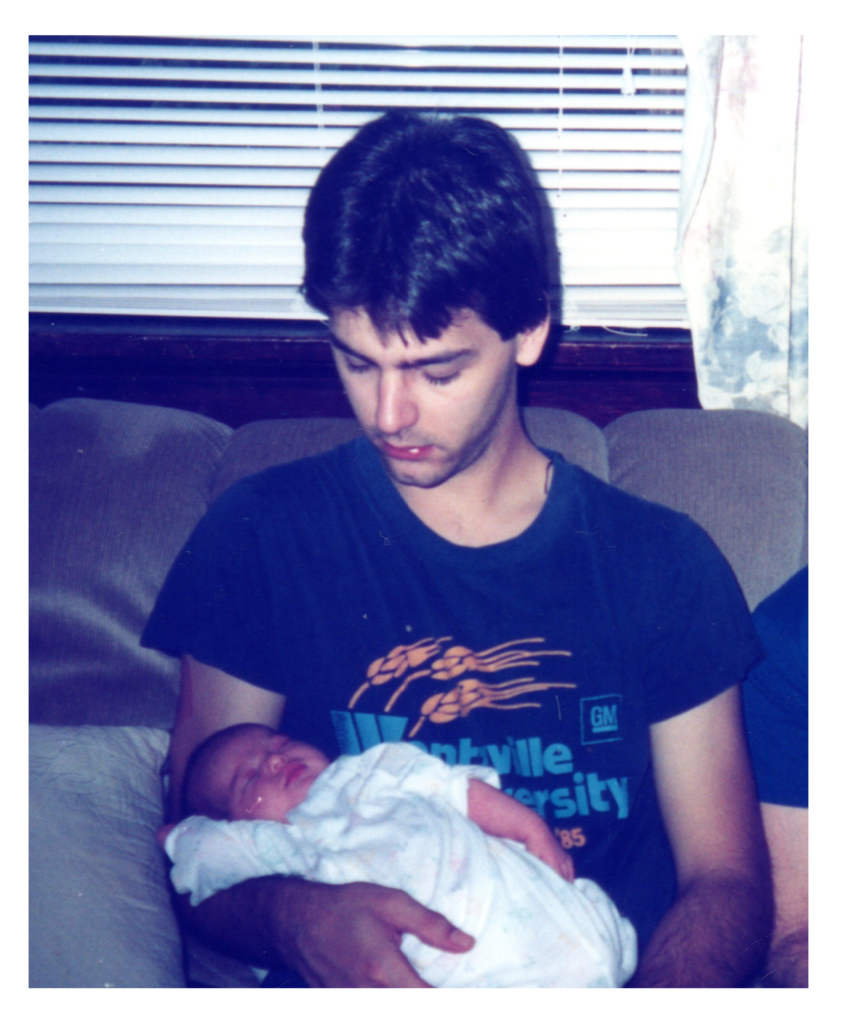
Mark: “What has it been like for you, being a Cannabis patient in a state where its not legal?”
Jim: “…it makes ya feel like a criminal… Just for using it to feel better.”
Mark: “You were arrested?”
Jim: “They came in and…they smelled it. Started looking around. Found the grow room. They asked for the key, but, I wouldn’t give it to them. So they just took a screw driver and got in there.
I didn’t have a bank account. I had just gotten paid with my Disability. I kept the money under my mattress.“ (Jim didn’t trust the banks.) “So I hear em searching.. I heard them say, ‘Oh we have money!’ So they took the money that I had. I probably had at least five hundred dollars. And I never did get it back. They never charged me with selling (thirty days and five years probation). So, I don’t know why they get to keep the money, or anything else, for that matter. If the house was paid off, they probably would have tried to take that.”
It was unconscionable, but civil forfeitures were common fare for Cannabis arrests, and the practice still continues. Whenever cash was found in a Cannabis bust, it meant a payday for the arresting agency. Civil forfeiture was created to fight organized crime. By draining a suspect of his assets, he wouldn’t have the funds to pay for a legal defense. It worked quite well with gangsters. It was only a small step for overly aggressive investigators to implement the practice in the private sector. 80% of any seized assets went to the local agency while 20% went to the Feds. Quite a temptation for the morally corrupt.
Publicly, it was said that these funds were used to purchase safety equipment and such, but records have shown that the funds usually went into a slush fund and were used for everything from recreational trips to parties for police personnel.
Law enforcement and the courts have never seemed to realize how devastating it was to take both a chronically ill patient’s money AND meds. Issues like Multiple Sclerosis, Parkinson’s and cancers require consistent REAL medical care. When Cannabis replaces toxic pharmacology, that doesn’t negate the seriousness of the treatment, or the ramifications when they’re withheld.
Statistics haven’t been very helpful in swaying politicians or even the average person on the street regarding Cannabis reform. Unfortunately, all too many of our population, unless they have personally experienced devastating illness, cannot fathom what its like. They don’t understand how a person’s life could be completely changed because of illness. The hope is that these videos will give people an opportunity to see somebody REAL. A real person talking about how Cannabis benefits them, even when facing a life-changing physical condition.
The disabled tend to lose their voice when they get sick. As far as most of the public is concerned, they’re invisible. That’s why I did these interviews, so people can see their faces and hear their voices. Their experiences. Where their life’s journey has taken them.
Mark: You mentioned side effects. What kind of side effects did you deal with taking pharmaceuticals?
Jim: They made me feel played out. Made me tired…more tired on top of being tired. And all kinds of side effects…none of them good.
Mark: And when you take Cannabis…?
Jim: I feel better cause my symptoms are gone. Not exactly like before MS but close. Finally free of these things … they’re finally gone.
Mark: So you have a better quality of life?
Jim: For sure. No doubt.
Mark: Excellent!
After the interview, I sat down next to Jim’s wheelchair. He had told me that it had been a while since he had access to any Cannabis. He had suffered with the symptoms of his MS – pain and spasms – for some time. So, I had brought a joint to share with him. I lit it up and passed it to him. We sat there silently in the midday light and shared that joint. It was strangely peaceful.
Suddenly, he leaned forward, placing his hands on his armrests and thrust himself to his feet.
I leaned back, frozen in my chair, not knowing what was happening. I didn’t know he could do that. I was left wondering if HE really knew that he could do that.
The tension in Jim’s face relaxed as he lifted his head, as if looking to the ceiling. Now standing upright untethered, a big smile swept across his face.
Jim exclaimed: “There it is!”
I was stunned. I didn’t know how to respond. After a little bit, he slowly sank back into his wheelchair.
Cannabis is a vascular dilator, so it helps get blood to atrophied limbs. And it relieves spasms, so it eases the painful contractions that are so common to Muscular Dystrophy sufferers. Something that is well-known among those with MS.
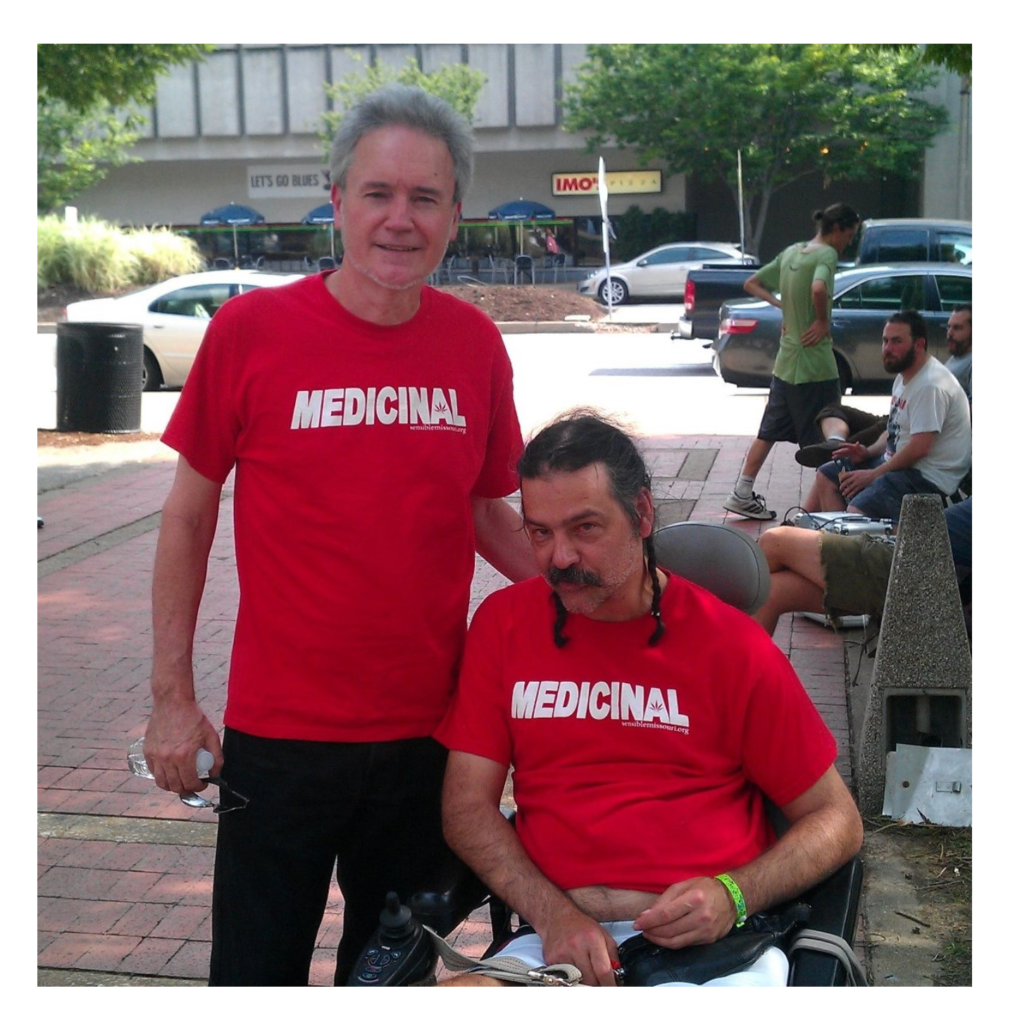
I would see Jim occasionally through the years that followed this interview. He even road the bus to my apartment for a visit or two.
Jim was robbed at his apartment door, coming home one evening. Fortunately, he wasn’t harmed. On another occasion, while overreaching for something on his floor, he tipped his power wheelchair over on himself. He laid there on his floor yelling for help for 18 hours before the Fire Department finally came and broke down his door. A year or two later, he turned his wheelchair over on himself again, only this time he was left for another 18 hours, staring up at a door with a broken lock, since his landlord had failed to repair it since the last incident.
It was during my visit with him in the hospital that I learned of it all. His months-long stays were crucial opportunities that sustained him through long periods of neglect and poor nutrition. He spent months as an inpatient usually.
After moving to Colorado, I only occasionally spoke with him by phone. It had always been my plan to somehow move him out with us. My associates and I had plans for a halfway house for refugees. We were even looking at purchasing a rundown motel. Unfortunately, that dream never materialized – not for Jim nor the many that I came to know through the years with similar predicaments.
Jim passed away on October 9th, 2014 at Barnes-Jewish Hospital in St. Louis. He was 49 years old.
Cannabis is nontoxic. Cannabis is food. Cannabis is the single most important medicine of the 21st century.
https://www.legacy.com/us/obituaries/newsobserver/name/james-hammond-obituary?id=12240255
